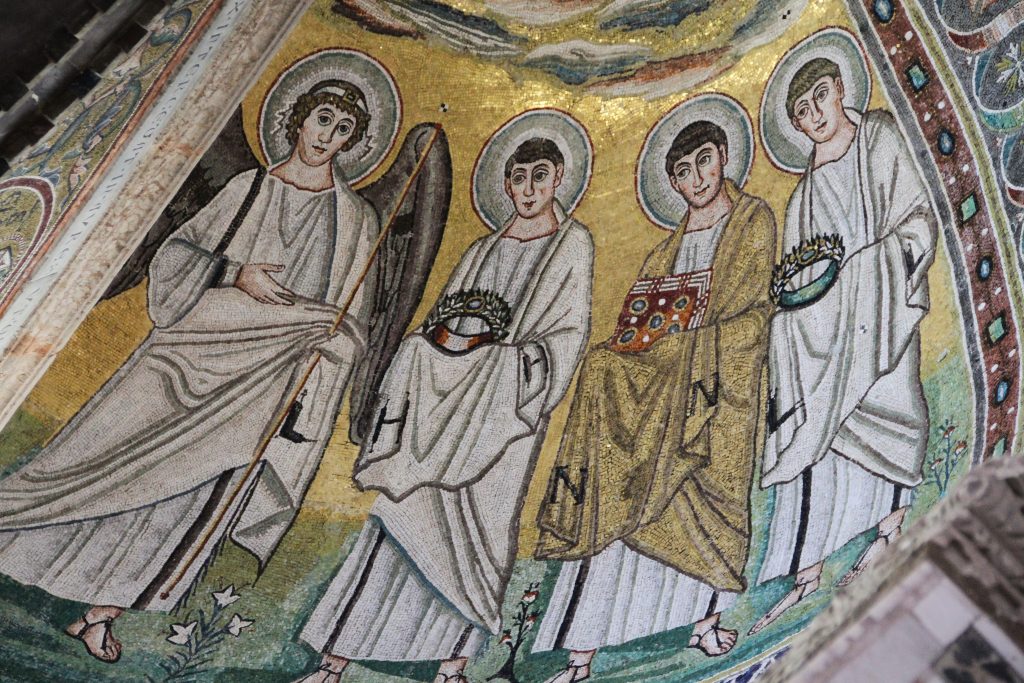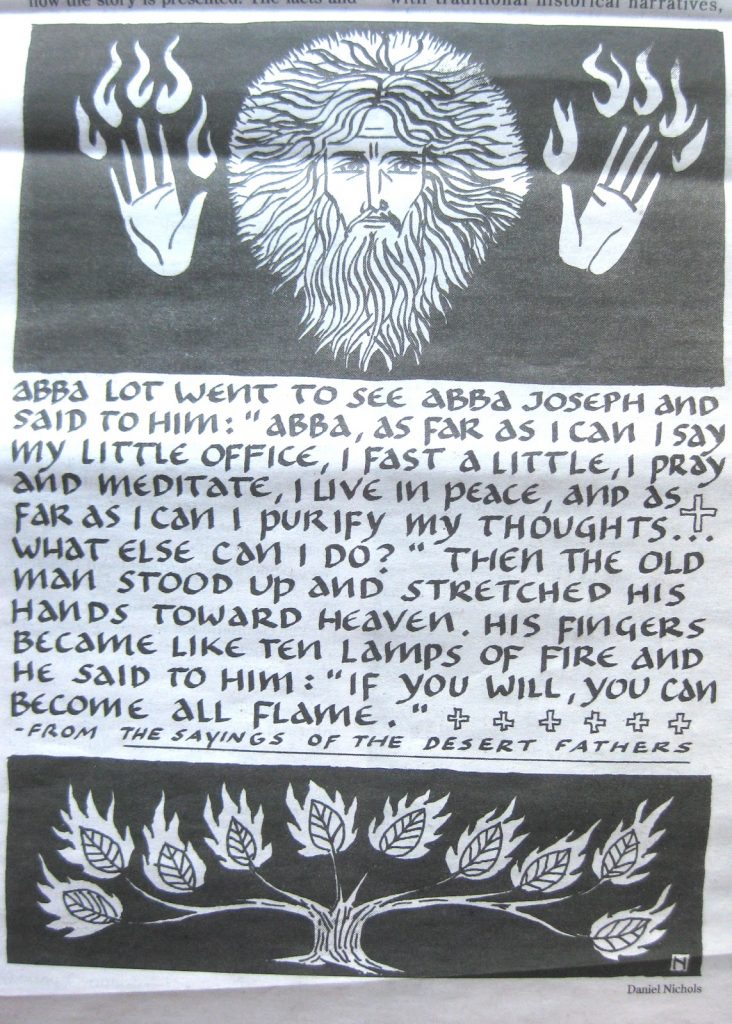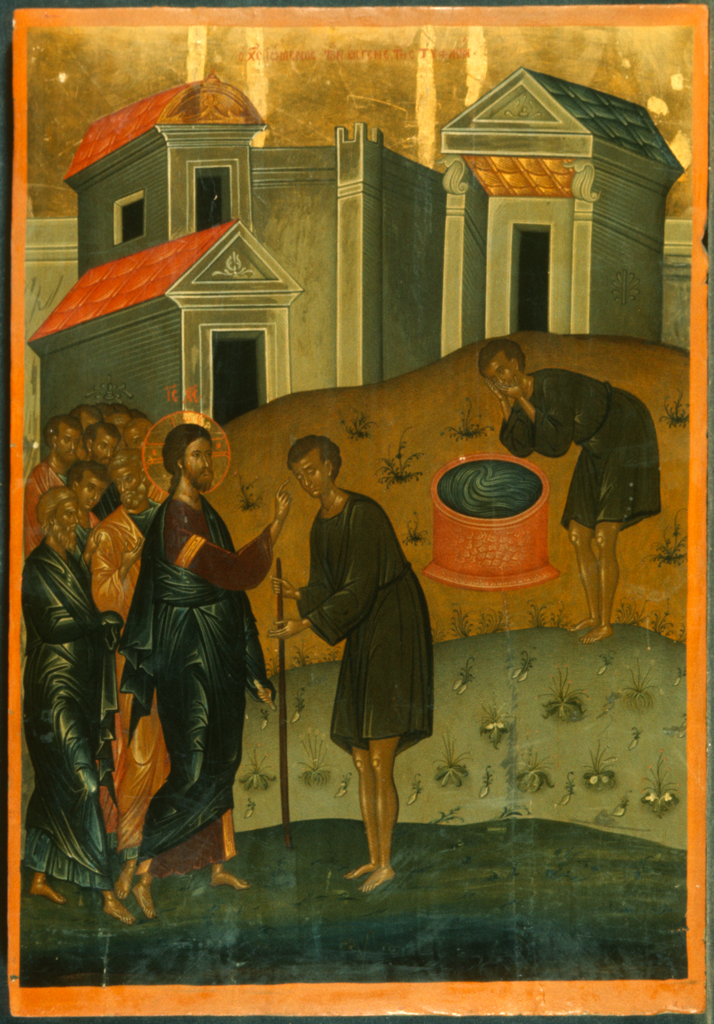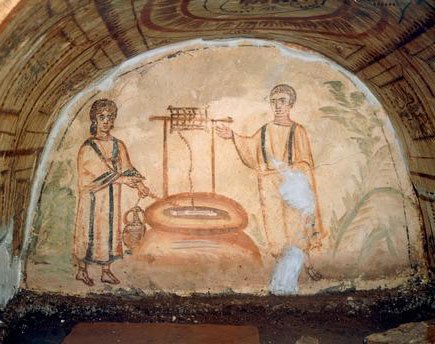We are now in the midst of the Apostles Fast. Several years ago, when my sister was first learning about the Byzantine tradition – we didn’t grow up in this tradition, you see – she asked me what this fast is all about and, because I didn’t really know, I said, “Well, we’re Byzantine and Byzantines love to fast. You might as well ask why we’re not fasting at any given time as why we are fasting.”
And that really is true. Fr. Sergei Sveshnikov, in his excellent article titled “Fasting for Non-Monastics,” which I recommend you all read, estimates that there are approximately 250 fasting days each year in our calendar. That’s more than half the year! Now, this varies depending on how you interpret the Typikon (I count closer to 190 days) and it varies quite a bit from year to year – mainly because of this fast – the Apostles Fast – which is a different length each year. It can be anywhere from two to six weeks in length. But my answer to my sister – that we fast because we love to fast and because it is good to fast – is really insufficient, I think, even if it is true. I mean, I want there to be something that makes this fast distinctly meaningful. And I believe there can be.
Historically, I am told, this fast developed to give those who were unable to fast during the Great Fast for various reasons – such as pregnancy or illness – an opportunity to fast. It’s sort of like summer school – a chance to catch up with those who may have gotten ahead of us last semester. But I also find this to be an insufficient reason for us all to continue observing this fast year after year – even those of us who did keep the Great Fast.
We call this the Apostles Fast simply because we fast until the great feast of the Holy and Preeminent Apostles Peter and Paul on June 29th. However, perhaps it is also meaningful that the first Sunday of this Apostles Fast, which is always the Second Sunday after Pentecost, we always read about the calling of the first apostles: Simon, who would become Peter, and Andrew, his brother, and then James and John, the sons of Zebedee. This fast, it would seem, from its movable beginning until its fixed end, is apostolic in its liturgical focus. And, indeed, we have much to learn from the apostles about ascetic practices like fasting and their role in our vocations.
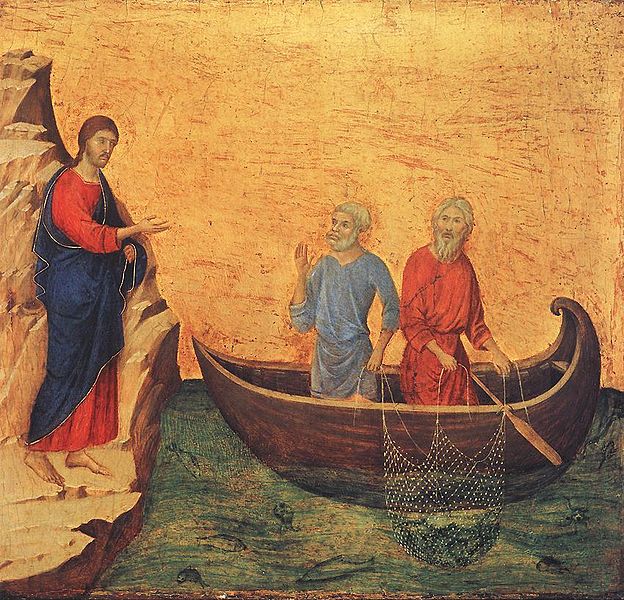
by Duccio di Buoninsegna
between 1308 and 1311
tempera on wood
Today, Andrew and Peter and James and John show us how to respond to vocation: immediately they leave behind everything they have – those fishing nets and boats were their livelihood – and they follow Jesus (Matt 4:20, 22). This is a pure ascetic act – an act of self-denial.
One thing that fasting can help teach us is detachment from the things of this world. Let us not be enslaved to a small sack of flesh[i] in our bellies. Then perhaps we will not even be enslaved to our employers, for example, or to any power in this world, even if it is our livelihood, but we will be free and ready to respond to the call of Jesus Christ in our lives when we hear it. If we train in this way (which is what the word askesis originally meant – training or exercise) during this Apostles Fast, we will be more ready, like the first apostles, to respond immediately, to immediately walk away from whatever worldly attachments we have accrued, and to follow our Lord wherever he goes, even to the cross, through which is everlasting life.
Peter immediately leaves everything to follow Jesus, but he did not always follow through. Just before Jesus was to be delivered up to death, Peter said that he would follow Jesus, even to death. “I will lay down my life for you,” he says to Jesus (John 13:37). These are good words, but when death is truly imminent, when Jesus is arrested and suffers imprisonment, lies, interrogation, spit, and beatings, Peter reveals his weakness – a weakness many of us share. His earlier words were only so much bravado and three times he denied even knowing Christ, let alone being his disciple and apostle.
This is not Peter’s finest hour. But it is an hour that many of us can relate to. Sad to say, I’ve heard lies come out of my own mouth before – merely to avoid an awkward situation regarding trivialities, let alone to avoid torture and death. Lord, have mercy on me the sinner. Perhaps the lies of my mouth have not been so weighty as Peter’s lie about not knowing Jesus, but what we practice in small things become the habits that inform our large decisions and responses. So, again, it is important to fast so that we are well-trained not to give in to our every impulse, but to watch carefully and discern in our hearts whether they are from the Lord or our passions or the demons.
After Peter’s denial will come his repentance and in this he is once again a good model for us during the Apostles Fast, which is a season of repentance. After his denial of Christ, Peter hears the rooster crow and he remembers that the Lord predicted his denial before the crowing and then he weeps bitterly (Matt 26; Luke 22). In the Greek prayer of absolution after the confession of sins, the priest recalls, “The Lord forgave Peter his denial when he wept bitterly.” Repentance and confession of our sins during this Apostles Fast and each of the four fasts is an essential part of our tradition and it is an essential part of our vocations, inasmuch as each of us are sinners and at times fail to follow the Lord wherever he goes.
We do all have a vocation, each and every one of us is called by the Lord, just as Peter and Andrew and James and John are called by the Lord today. We are not all called to be apostles, of course, but we are all called by Christ to a life in Christ. It will take its own shape as he intends for us and as is best for us. Whatever shape our vocation takes, the fasting, prayer, and repentance that we emphasize during this Apostles Fast are necessary tools for walking the narrow way he calls us to.
The word “vocations” is often bandied about, misused, and over-specialized. When people talk about vocations – we need to pray for vocations, they say, or, the Church is suffering from a vocations crisis, you will sometimes hear – they are often actually talking only about vocations to the priesthood.
Sadly, the vocations crisis extends well behind the priesthood. There should be more deacons than there are priests, if you ask me, and the opposite is the case. There’s a long-lasting crisis in the vocation to the diaconate. I’ve only been a priest for a few years, but it is still disturbing that in this time I have celebrated only one baptism and only one crowning in marriage. There is a crisis in the vocation to marriage and even to the life in Christ.
It’s an error to say that there is a shortage of vocations. That would imply that God is not calling – that God is not doing his job, not holding up his end of the deal and, frankly, I find that a blasphemous suggestion. God is calling to the priesthood, to the diaconate, to the monastic life, to marriage, but we are not responding. We are not answering God’s call. We are not immediately leaving behind our nets – our earthly toils and vain anxieties – and following him wherever he goes.
One reason so many of us are ignoring the call of the Lord is that we have failed to train to be at the ready to respond to his call by a life a prayer, fasting, almsgiving, and repentance. We’re not taking this seriously, when in fact there is nothing more important. Our priorities are out of whack. We seek immediate comfort rather than everlasting life. Let us take this Apostles Fast as an opportunity to reverse these tendencies in our lives.
Our Lord is saying to us all, “Come, follow me.” Let us train and ready ourselves like soldiers at attention to respond to that call.
[i] “If you cannot be in control of your stomach, if this simple sack of flesh is the ruler your life, how can you hope to be in control of more complex physiology, or your mind, or your soul?!” (Sveshnikov)
